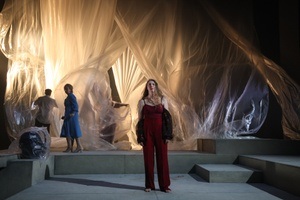Emilia_Galotti
In the organizer's words:
SCHAUSPIEL
Little House
after Gotthold Ephraim Lessing
Director: Rahel Hofbauer
Emilia is beautiful, Emilia is virtuous, Emilia is a "virgin". The prince desires her, his chamberlain arranges the murder of her bridegroom and her father stabs her out of fear for her virtue. Throughout the drama, the title character herself remains merely a projection screen and the object of male possessiveness. This bourgeois tragedy from the 18th century is one of the key works of the Enlightenment and remains an integral part of the German-language literary canon to this day, and is now a subject for A-levels in Bremen. But how do we read and tell stories today that are characterized by patriarchal structures? In her directorial debut, Rahel Hofbauer sharpens the focus on domination, power and masculinities. How can the title character be exposed as a blank space by focusing on the roles that drive the plot? How can this blank space be used to create room for new readings and perspectives?
This content has been machine translated.












